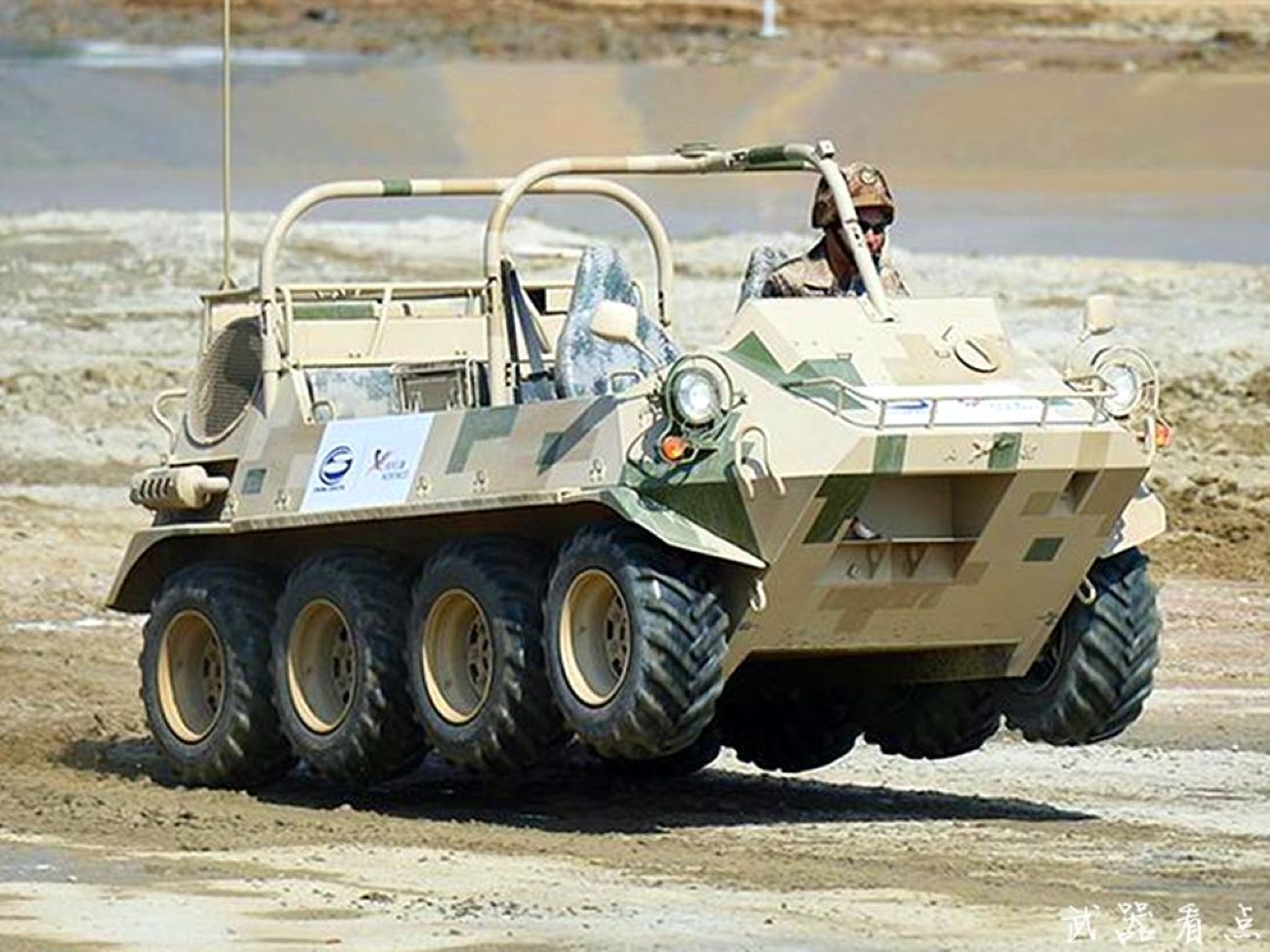A concept computerized video showing Chinese unmanned-capable multipurpose All-Terrain Vehicles (ATV) performing combined arms and networked strikes on enemy positions reveals ominous signs for India, given the background terrain portrayed.
As social media posts have called the series, the Lynx ATV appeared in promotional videos last year, showing the most diverse variants for nearly all ground operations.
China possesses the most diverse range of unmanned systems – aerial, sea-borne, and ground – fielded and has unveiled many of them even before the latest Zhuhai Air Show.
Unmanned Surface Vessels (USVs) can threaten the United States Navy in the western Pacific theatre; however, India can afford to be not too worried about them in the region.
The chances of a naval engagement between India and China either in the South China Sea (SCS) or the Indian Ocean Region (IOR) are little to none, given the lack of appetite in both parties for challenging the other in either of their home seas.
However, Chinese UAVs challenge both countries equally and would be a defining feature in both theatres.
But ground forces particularly are threatening to India, given the predominance of the terrain and the core political reason for tension between the two countries – contested land territories.
On the contrary, the likelihood of a ground war between the US and China is little to none and would primarily be a naval and air clash. The only conceivable scenario under which US and Chinese land armies would clash would be in the event of an invasion of mainland China.
All Purpose Unmanned-Capable ATVs
Called the Lynx ATV, the videos show the vehicle’s most varied variants, ranging from troops carrier; logistics; medical evacuation (MEDEVAC); surveillance; mortar carrier; infantry support; miniature command and control, air defense; and swarm drone launcher. The video shows threatening small unit tactical force multiplier capabilities, appearing to operate at the Platoon to Company level.
The official Chinese military video showed tracked and wheeled ATVs carrying troops, operating in three types of terrain – jungle, riverine, mountainous desert, and high altitude snow-clad. It shares all these geographies with India in its southern and southwestern border.
The video shows troop carrier ATVs disembarking from PLAAF’s new indigenous Y-20 strategic airlift transport plane.
A recon ATV meanwhile scans its surroundings from a height in a mountainous region and coordinates with other ATV-mounted recon units, lightweight tactical drones, and a two-person command center inside another ATV. They detect fixed and moving ground targets and plan a multi-pronged attack on a major enemy base camp from various directions.
From the graphic, it almost appears to be Battalion headquarters-sized encampment. Of the 27 different ATVs, 12 include two mobile command centers and two drone launchers, and eight comprise infantry fighting support and troops carriers connected to an ISR-capable UAV on overwatch.
Others outside this ‘core network,’ including the mortar and other Infantry Fighting-All Terrain Vehicles (IF-ATV), are connected among themselves. A satellite shows a standard uniform coverage to all assets, indicating a dedicated military-use part of the BeiDou satellite navigation constellation.

Meanwhile, the surveillance and command and control (C&C) ATVs are linked to a larger command and control, supposedly a Corps-level formation directly under the Western Theatre Command. Mortar ATVs then shell an outpost, and several dozen kamikaze munitions launched from an unmanned ATV hit three tactical vehicles.
The most frightening was 20-25 mm autocannons mounted on unmanned IF-ATVs taking out heavily reinforced machine gun encampments perched at a height. This is possibly the most telling since it challenges the time-tested practice in mountain warfare to dominate heights.
Other unmanned ATVs with autocannons and heavy machine guns take out ground trenches and defense lines which are fighting back with machine guns and armored tactical vehicles. Some unmanned ATVs are then seen carrying supplies and fuels to forward troops.
Interestingly, many of the ATVs seen are shown to have manual controls in the form of a steering wheel, which allows for quick human intervention in case of glitches with a remote control or avoiding detection through Radio Frequency (RF) transmissions.
The actual video of the ATVs surfaced in October of last year and was prepared and released by China North Industries Group Corporation Limited (NORINCO). It showed an IF-ATV with the autocannon; a mortar ATV; a tube rocket artillery firing vehicle; one with four Man-Portable Air Defence (MANPAD) missiles; one carrying fuel boxes in the hold for tactical resupply; a recon ATV; an ATV carrying a trailer that has a dome-like shape indicating signals, communications relay or tactical-level electronic warfare. A crew of two soldiers remotely controls all.
A promotional video of the new Chinese optional manned ATV family.#PLA #China #ATV pic.twitter.com/zToRGlVugm
— ??? ???? ???????? (@TheDeadDistrict) October 17, 2021
Implications For India
Lt Gen HS Panag (Retd), a former Northern Army Commander, agreed that the concepts posed a threat to the Indian Army in Ladakh while speaking to the EurAsian Times.
“Like UAVs can be controlled, so can unmanned tanks and guns,” he said. “The issue is cost,” he said when asked what India needed to look out for. Panag is probably referring to the heavy costs involved in such modernization, which will possibly fumble given India’s current economic dire straits.
China’s techno-industrial efforts and rapid industrialization involving high-tech manufacturing automatically afforded it the economic wherewithal and technical capability to modernize its armed forces.
India meanwhile pursues only one-off efforts in defense indigenization. Moreover, such heavy usage of unmanned ground vehicles is in line with the “mechanization” goals of the PLA envisaged in its 2019 Defense White Paper.
- The author can be reached at satamp@gmail.com
- Follow EurAsian Times on Google News




